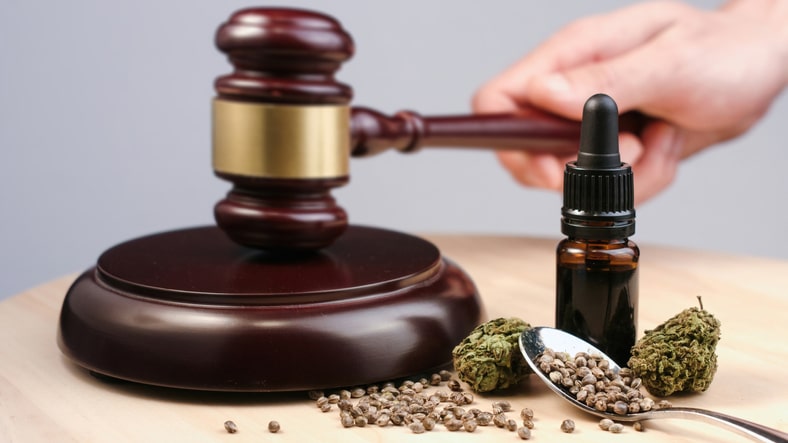Having worked in the California cannabis legal industry since 2008, we’ve helped state-legal cannabis operators make sense of federal policy discussions calling for changes to the classification of cannabis, and how potential changes could impact them, for years.
In October 2022, President Biden famously requested the U.S. Secretary of Health and Human Services (“HHS”) conduct an administrative review of the federal classification of cannabis.
HHS conducted the scientific and medical review, found there is a “currently accepted medical use” for cannabis, and recommended that the U.S. Drug Enforcement Administration (“DEA”) reclassify cannabis from Schedule I to Schedule III under the Controlled Substances Act (“CSA”). The DEA is now contemplating its scheduling decision.
When issued, the rescheduling recommendation was met with a mix of praise and criticism. Some argued rescheduling would not go far enough to remedy the harms of the War on Drugs; Others were more optimistic about the proposed change’s potential impact on the cannabis industry, and argued that it’s a change worth rallying behind.
Now, just weeks out from 4/20, key advocacy and industry organizations have aligned with the unified position that Schedule III is not enough––Cannabis must be removed from the Controlled Substances Act, all victim-less cannabis prisoners must be freed, and their records must be cleaned. U.S. legislators across the country recently voiced their support for this position in a letter to the U.S. Attorney General and DEA, urging them to completely remove cannabis from the CSA.
While Schedule III Would Create Some Tax Relief For State-Legal Cannabis Operators, Those Businesses Would Remain Federally Illegal
Importantly, Schedule III would not, on its own, legalize existing state-legal cannabis programs or the businesses that operate within them, remove criminal penalties associated with cannabis, or provide relief to current and formerly incarcerated individuals with cannabis charges.
Rather, as our California cannabis attorneys previously covered, Schedule III would legalize U.S. Food and Drug Administration (“FDA”) compliant medical cannabis use, open up regular business tax deductions and credits to cannabis operators which are now prohibited under Section 280E, and remove barriers to research cannabis. This would significantly increase available cash flow for cannabis operators, which in turn could invest more into their businesses and employees.
While Schedule III would arguably have some positive impact on the cannabis industry, advocates argue that the complete descheduling of cannabis, rather than moving it to Schedule III, is the only logical and sufficient step.
The Case for “Descheduling” Cannabis
The term “descheduling” refers to the process whereby a previously scheduled substance, like cannabis or psychedelics, is completely removed from the list of controlled substances under the CSA. This would effectively federally legalize cannabis, remove the regulations imposed by the CSA, and remove the DEA’s authority to regulate cannabis.
At Manzuri Law, our California attorneys saw this occur when Congress passed the federal 2018 Farm Bill, which removed cannabis products containing less than 0.3 percent THC (i.e., hemp) from the CSA. As a result of this descheduling, it is now federally legal to cultivate, sell, and possess hemp across the country. Once hemp was descheduled, the U.S. Department of Agriculture was directed by statute to regulate hemp production, taking the place of the DEA.
Similarly, the ways in which dietary supplements, vitamins, tobacco, and alcohol are regulated provide additional insight into how cannabis may be regulated post-descheduling. These substances are not controlled substances, and are regulated by a combination of federal and state regulations.
Take alcohol, for example. States retain primary control and authority over alcohol, and most states have a state agency that oversees the commercial alcohol supply chain. Some states also allow local agencies to regulate alcohol within their jurisdictions. At the federal level, various regulations address matters such as federal taxes, production, importation, labeling and advertising, and public education and safety.
In the context of cannabis, the majority of states have already established state-legal programs to regulate cannabis. The legal structure of descheduling would permit these states to continue operating these programs, thereby rendering those state-legal operators as federally legal. Moreover, those states that currently prohibit cannabis, in part or whole, could likewise continue to do so.
In contrast, Schedule III would only federally legalize FDA compliant cannabis products. This means that, for cannabis to be sold and consumed, the FDA would need to approve cannabis for medical use. FDA-approved pharmaceuticals must be reliably uniform, and thus cannabis in raw plant form is not likely to be FDA approved. Rather, cannabis compounds in pill form are more likely what would result under this model (like Epidolex, a CBD-based drug). Operators would be subject to DEA regulatory requirements, and cannabis patients would need to obtain a valid prescription to obtain cannabis from their medical provider.
In short, descheduling provides a pathway to legalize existing state-level cannabis regulatory programs and opportunity for the existing industry to grow. In contrast, Schedule III would only legalize FDA-approved cannabis products, which would have little to no impact on the existing industry infrastructure.
Under Schedule III, these state-legal programs and the operators within them would remain federally illegal––and the criminal penalties in the CSA would remain applicable. While there is no evidence suggesting that the DEA would take a renewed interest in prosecuting state-legal cannabis businesses, advocates argue that it is nonsensical to permit the threat of federal prosecution to continue.
Join the Movement
The Manzuri Law team welcomes you to contact one of our California cannabis law attorneys online and/or to sign up for our newsletter to stay abreast of cannabis policy developments at the federal, state, and local level.
Sign-up for information from our friends at Last Prisoner Project on how you can get directly involved with organizing to pressure Congress and President Biden to completely deschedule cannabis leading up to the 4/20 Day of Unity in Washington, D.C.

